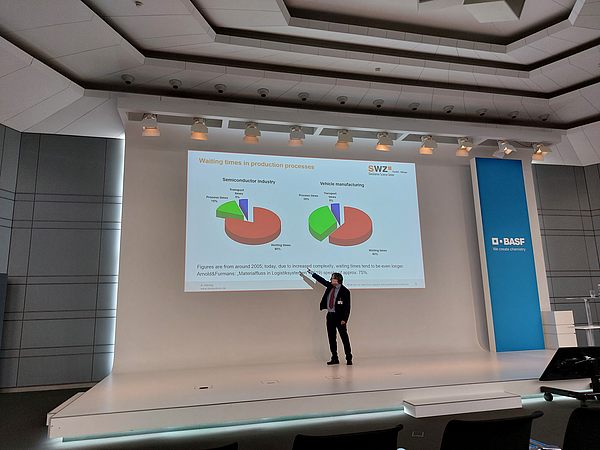Digital twin of the quality control laboratories of BASF
Digital twin of the quality control laboratories of BASF
The quality control department of BASF's Nutrition & Health division tests a wide range of products such as flavors, enzymes, excipients and active ingredients for the pharmaceutical industry as well as additives for human and animal nutrition. The products are used in food production, among other things. In order to ensure functioning supply chains in the food sector, both regular and ad-hoc demands must be met on time. This requires a smooth production process and reliable quality control and quality assurance. No less important, however, is forward-looking personnel deployment planning that anticipates possible orders.
Several thousand different tests can be carried out by certified personnel in the quality control laboratories at the Ludwigshafen site. Samples from over 500 product types from more than 10 different production plants come together in the quality control department. Depending on the type and number of samples, more or fewer analyses of different types are required, which place a strain on both the laboratory equipment and the employees in different ways. On average, between 10 and 40 analyses are carried out per sample. This results in around 180,000 individual analyses per year. The quality control laboratories create a dependency between the various production lines at BASF: if more samples are received from one production line, this also has an impact on the throughput times of all other samples due to the limited capacity of the laboratories.
In order to analyze these dependencies, to estimate throughput times in relation to future incoming orders as precisely as possible and also to be able to evaluate possible investment decisions in terms of their impact on the overall performance of the laboratories, the Clausthal-Göttingen Simulation Science Center (SWZ) and BASF launched a joint project in spring 2022: the Digital QC Twin. The project examines the branching of different sample types that are distributed across several analysis stations in the laboratory. The necessary operating times at the respective laboratory stations will be scrutinized, as will the individual links between different stations at which employees are deployed.
The specific analyses and modeling are carried out in close coordination between the specialist departments at BASF and the working group at Clausthal University of Technology. In this way, scientific concepts and analysis methods developed at the university can be quickly put into practice and calculation methods can be integrated directly into production planning tools.
A simulation model consisting of almost 500 components is set up on the basis of the data obtained. With the help of this model, it is possible to investigate the lead times for certain samples under different future order intake scenarios, as well as which organizational changes or investments have a positive influence on lead times and thus delivery reliability.
Press releases (in German language only)
- 2023-09-14: Digitaler Zwilling und Warteschlangentheorie: Vortrag in Ludwigshafen auf Basis des gemeinsamen Projektes von BASF und SWZ
- 2023-02-03: Digitaler Zwilling der Qualitätskontrolllabore der BASF: Die BASF und das SWZ analysieren in einem gemeinsamen Projekt die Abläufe in der Qualitätskontrolle bei der BASF aus warteschlangentheoretischer Sicht.

